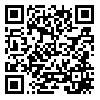Volume 16, Issue 1 And 1 (3-2023)
IJMEHM 2023, 16(1 And 1): 94-110 |
Back to browse issues page
Download citation:
BibTeX | RIS | EndNote | Medlars | ProCite | Reference Manager | RefWorks
Send citation to:



BibTeX | RIS | EndNote | Medlars | ProCite | Reference Manager | RefWorks
Send citation to:
Shahrabadi R, Javan R, Zardosht R, Ansari M, Rabiei M, Yazdimoghaddam H. Explaining the Components of Professional Ethics in Therapeutic and Health Interactions With Patients Using the Delphi Method. IJMEHM 2023; 16 (1 and 1) : 8
URL: http://ijme.tums.ac.ir/article-1-6611-en.html
URL: http://ijme.tums.ac.ir/article-1-6611-en.html
Reza Shahrabadi1 
 , Roghayeh Javan2
, Roghayeh Javan2 
 , Roghayeh Zardosht3
, Roghayeh Zardosht3 
 , Mojgan Ansari4
, Mojgan Ansari4 
 , Mehdi Rabiei5
, Mehdi Rabiei5 
 , Hamideh Yazdimoghaddam *
, Hamideh Yazdimoghaddam * 
 6
6

 , Roghayeh Javan2
, Roghayeh Javan2 
 , Roghayeh Zardosht3
, Roghayeh Zardosht3 
 , Mojgan Ansari4
, Mojgan Ansari4 
 , Mehdi Rabiei5
, Mehdi Rabiei5 
 , Hamideh Yazdimoghaddam *
, Hamideh Yazdimoghaddam * 
 6
6
1- Associate Professor, Department of Health Education & Public Health, School of Health, Sabzevar University of Medical
2- Assistant professor, Non Communicable Disease Research Center, Department of Persian Medicine, School of Medicine, Sabzevar University of Medical Sciences, Sabzevar, Iran
3- Associate Professor, Non Comunicable Disease Research Center, Operating Room Department, Faculty of Paramedices, Sabzevar University of Medical Sciences, Sabzevar, Iran
4- Assistant professor, Non Comunicable Disease Research Center, Nursing Department, Faculty of Nursing, Sabzevar University of Medical Sciences, Sabzevar, Iran
5- Assistant professor, Non Comunicable Disease Research Center, Sabzevar University of Medical Sciences, Sabzevar, Iran
6- Associate Professor, Non Comunicable Disease Research Center, Operating Room Department, Faculty of Paramedices, Sabzevar University of Medical Sciences, Sabzevar, Iran.
2- Assistant professor, Non Communicable Disease Research Center, Department of Persian Medicine, School of Medicine, Sabzevar University of Medical Sciences, Sabzevar, Iran
3- Associate Professor, Non Comunicable Disease Research Center, Operating Room Department, Faculty of Paramedices, Sabzevar University of Medical Sciences, Sabzevar, Iran
4- Assistant professor, Non Comunicable Disease Research Center, Nursing Department, Faculty of Nursing, Sabzevar University of Medical Sciences, Sabzevar, Iran
5- Assistant professor, Non Comunicable Disease Research Center, Sabzevar University of Medical Sciences, Sabzevar, Iran
6- Associate Professor, Non Comunicable Disease Research Center, Operating Room Department, Faculty of Paramedices, Sabzevar University of Medical Sciences, Sabzevar, Iran.
Abstract: (766 Views)
The health team, in their daily operations, are faced with many ethical issues they have to solve. Moral knowledge includes confronting with and resolving conflicts, values, norms, interests, or laws. Identifying the ethical challenges of the health system can contribute to the efficiency of educational and health programs of universities of medical sciences. The objective of this study was to explain the components of professional ethics in therapeutic and health interactions with patients. In this qualitative research, the Delphi method was used to determine the components of professional ethics. The participants were composed of three groups including faculty members, students, and clinical staff who were selected using purposive sampling. First, by reviewing the literature, a semi-structured questionnaire was developed to investigate different components of professional ethics. Then, using the Delphi method in four rounds, the ethical components were selected and by checking content validity indices (CVR and CVI), the final version of professional ethics components was explained based on therapeutic and health interactions with patients. The results of the qualitative research and the Delphi model led to the extraction of the 12 most common ethical components including disclosure of patients’ secrets, lack of justice in providing services, lack of respect for the patient’s discretion, medical and treatment staff errors, lack of compliance with regulations and standards of treatment and care, non-observance of legal regulations in telling bad news by the doctor, non-observance of dying patient’s rights, non-observance of patient’s privacy, lack of proper training of care principles and new and up-to-date treatment tips to students and staff, and finally, non-observance of professional communication. Accordingly, the final components were compiled as a questionnaire. Achieving ethical competence requires the identification of ethical components in educational, therapeutic, and care environments, especially in interaction with the patient. Therefore, it is necessary to identify, structure and formulate ethical components in regular and continuous training programs in the field of importance and observance of ethical principles in medical and health centers.
Article number: 8
Type of Study: Research |
Subject:
Medical Ethics
Received: 2023/08/11 | Accepted: 2024/01/21 | Published: 2023/03/30
Received: 2023/08/11 | Accepted: 2024/01/21 | Published: 2023/03/30
| Rights and permissions | |
 |
This work is licensed under a Creative Commons Attribution-NonCommercial 4.0 International License. |




